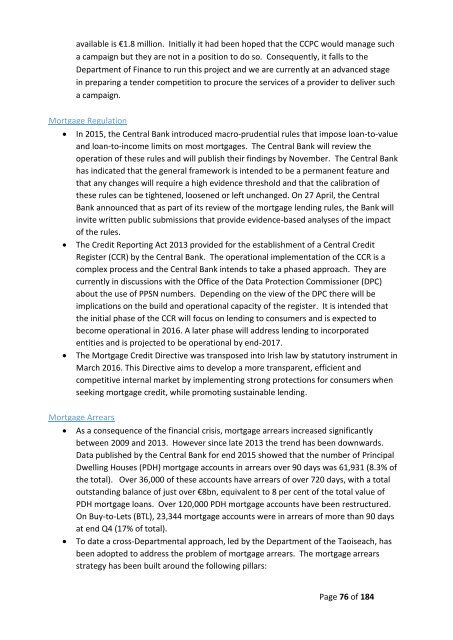Minister’s Brief
20160229%20Minister%20for%20Finance%20Brief%20redacted%20web
20160229%20Minister%20for%20Finance%20Brief%20redacted%20web
Create successful ePaper yourself
Turn your PDF publications into a flip-book with our unique Google optimized e-Paper software.
available is €1.8 million. Initially it had been hoped that the CCPC would manage such<br />
a campaign but they are not in a position to do so. Consequently, it falls to the<br />
Department of Finance to run this project and we are currently at an advanced stage<br />
in preparing a tender competition to procure the services of a provider to deliver such<br />
a campaign.<br />
Mortgage Regulation<br />
<br />
<br />
<br />
In 2015, the Central Bank introduced macro-prudential rules that impose loan-to-value<br />
and loan-to-income limits on most mortgages. The Central Bank will review the<br />
operation of these rules and will publish their findings by November. The Central Bank<br />
has indicated that the general framework is intended to be a permanent feature and<br />
that any changes will require a high evidence threshold and that the calibration of<br />
these rules can be tightened, loosened or left unchanged. On 27 April, the Central<br />
Bank announced that as part of its review of the mortgage lending rules, the Bank will<br />
invite written public submissions that provide evidence-based analyses of the impact<br />
of the rules.<br />
The Credit Reporting Act 2013 provided for the establishment of a Central Credit<br />
Register (CCR) by the Central Bank. The operational implementation of the CCR is a<br />
complex process and the Central Bank intends to take a phased approach. They are<br />
currently in discussions with the Office of the Data Protection Commissioner (DPC)<br />
about the use of PPSN numbers. Depending on the view of the DPC there will be<br />
implications on the build and operational capacity of the register. It is intended that<br />
the initial phase of the CCR will focus on lending to consumers and is expected to<br />
become operational in 2016. A later phase will address lending to incorporated<br />
entities and is projected to be operational by end-2017.<br />
The Mortgage Credit Directive was transposed into Irish law by statutory instrument in<br />
March 2016. This Directive aims to develop a more transparent, efficient and<br />
competitive internal market by implementing strong protections for consumers when<br />
seeking mortgage credit, while promoting sustainable lending.<br />
Mortgage Arrears<br />
<br />
<br />
As a consequence of the financial crisis, mortgage arrears increased significantly<br />
between 2009 and 2013. However since late 2013 the trend has been downwards.<br />
Data published by the Central Bank for end 2015 showed that the number of Principal<br />
Dwelling Houses (PDH) mortgage accounts in arrears over 90 days was 61,931 (8.3% of<br />
the total). Over 36,000 of these accounts have arrears of over 720 days, with a total<br />
outstanding balance of just over €8bn, equivalent to 8 per cent of the total value of<br />
PDH mortgage loans. Over 120,000 PDH mortgage accounts have been restructured.<br />
On Buy-to-Lets (BTL), 23,344 mortgage accounts were in arrears of more than 90 days<br />
at end Q4 (17% of total).<br />
To date a cross-Departmental approach, led by the Department of the Taoiseach, has<br />
been adopted to address the problem of mortgage arrears. The mortgage arrears<br />
strategy has been built around the following pillars:<br />
Page 76 of 184


